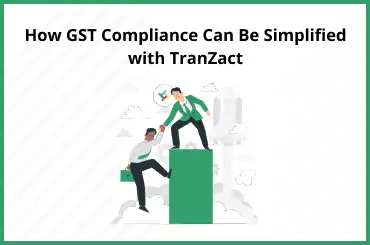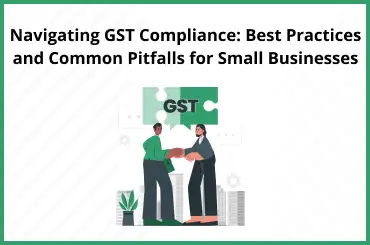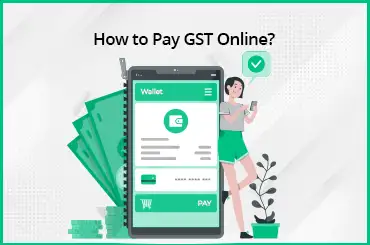In India, the Goods and Service Tax (GST) was implemented to make sure systematic taxation and economic growth management. Yet, many SME businesses struggle with heavy penalties and fail to complete their GST compliance processes. That is why following GST compliance for manufacturing businesses is important for smooth operations and to prevent legal issues in the future.
In this blog post, we will learn about GST compliance, including solutions and a checklist, the best practices and common pitfalls to avoid.
Understanding GST Compliance for Small Businesses
GST is a unified tax system introduced by the government of India for easy tax filing. GST compliance for small businesses includes invoice generation, return filing, and more. It helps in a smooth taxation process on time. If you avoid any of the rules and regulations, you might need to pay penalties, which can also lower your market credibility. It has three types:
- CGST: It is the central government tax that applies when you trade within a state.
- SGST: It is the state government tax that applies when you trade within a state.
- IGST: It is an integrated tax that is collected by the central government when you trade outside of the state where your business is established.
In India, businesses whose annual turnover exceeds Rs. 40 lakhs (for goods) or Rs.20 lakhs (for services) must pay GST. If your annual turnover is above this threshold, you can take advantage of ITCs (Input Tax Credits) and get compensation on your paid taxes.
What is GST Compliance?
GST compliance means following the regulations set by the Goods and Service Tax Council implemented in India in July 2017. It means completing GST requirements, having a valid registration, GST return filing online, payment of taxes, and maintaining records or reconciliations till invoices.
GST compliance for SMEs in India is important for maintaining financial stability, building a good reputation, and avoiding higher costs. It helps maintain the right GST compliance rating, a score the government gives to the business on different parameters. If you fail, it can result in penalties and legal problems that may affect sales and supplies in your manufacturing business.
Challenges Faced by Small Businesses in Ensuring GST Compliance
Following GST compliance for small businesses is the best solution for easy operations and avoiding legal complications. However, many SMEs face some challenges which are given below-
- The complex regulations set by the government. Businesses must be aware of these regulations to avoid struggling to meet these challenges.
- GST compliance and its processes need accounting and ERP systems for filing returns or generating invoices. However, if businesses are unable to understand the advancement of software or technology, then it can create problems.
- When employees lack GST knowledge, they face difficulties with filings, improper invoicing, and other compliance-related issues. This leads to noncompliance and stops growth.
- Many manufacturers operate with limited resources, making compliance with GST rules difficult. A lack of tools creates problems in keeping records of production, invoices, and payment details. Further, it leads to face issues in GST compliance.
What is GST Registration?
GST registration is the process of obtaining a unique identification number for a business that should pay Goods and Service Tax (GST). Registration under GST is required when the company reaches an annual turnover of 20 lakh to 40 lakh, depending on the nature of the business.
Once the manufacturing business is registered under GST, they get a 15-digit GSTIN number. This GST number is used for further compliances and transactions. For smooth and valid GST registration, the required documents are given below-
- Permanent Account Number (PAN).
- The Aadhar Card of the business owner for identity proof.
- Business address proof, such as physical location, utility bill, or rent agreement.
- Bank account details are needed to receive electronic funds for business and for the government to refund any deposit.
Process of GST Registration
GST compliance for small businesses starts with valid registration. GST registration can be obtained either by yourself or by hiring a tax consultant. Here is the step-by-step process to get a GST registration number.
- Visit the official GST portal at https://www.gst.gov.in and then click on the 'Register Now' link.
- Select New Registration and fill in the necessary details, such as taxpayer, state or district, company PAN card, email ID, mobile number, and captcha.
- After OTP validation, you will see the TRN number being generated, which will be needed for future transactions.
- Enter business details and upload valid documents, bank information, or others.
- Proceed to the next page for verification. Once you have done so, you will receive the GST number within 2 to 6 business working days.
Applicability of GST Registration for Small Businesses
The GST registration applicability depends on the annual turnover. Under goods and services tax (GST), businesses whose turnover exceeds Rs. 20 lakh for manufacturing or Rs. 40 lakh for service providers within the same state are eligible to pay GST. This is necessary for smooth business functioning and maintaining tax profiles.
Invoicing Under GST
Tax invoices and bills of supply are two important documents for small businesses' GST compliance. It must be followed with correct information to authenticate transactions. The invoicing under GST should include the following information-
- Registered GST number
- Supplier's name and address
- Recipient's name and address
- Invoice number
- Invoice creation date
- A description of the goods or services
- The quantity of those goods or services
- Taxable value
- Due amount
- The applicable GST rate
Input Tax Credit (ITC) Reconciliation
The input tax credit comes under GST compliance which can be claimed by SMEs to reduce their tax liability. Accurate claims for ITC reconciliation help you avoid penalties and maintain GST compliance. To file ITC, you need to share the correct records of all the purchases made for raw materials, machinery, and other supplies.
GST Liability
Understanding applicable GST rates for goods and services is necessary to calculate accurate tax rates and prevent miscellaneous. Manufacturers should meet the deadlines for GST payments to avoid penalties. Output tax liability and input tax credit are two components of GST liability. It is the collection and payment of the GST amount within the given time frame.
GST Return Filing
GST return filing is an important segment of GST compliance. Filing GST returns depends on the type of business and turnover to maintain compliance. It must be filed on a quarterly or annual basis so that the business does not incur extra costs. Opting for GST compliance software can ease your invoicing process, maintain records, automated calculations, taxable payments, and more with accuracy.
Best Practices for GST Compliance
GST compliance for small manufacturing businesses is challenging. Here are the best practices for GST compliance for manufacturing businesses to prevent penalties, optimize tax benefits, and maintain smooth processes.
- File GST Returns on time to avoid penalties and interest charges.
- Reviewing the due dates for filing returns or seeking any necessary changes will help businesses stay compliant.
- Try to reconcile GST Returns with Financial Records to avoid any discrepancies and thereby address and rectify.
- Issue accurate tax invoices according to GST regulations. Make sure that every detail, such as GST registration number, customer details, invoice number, date, and the amount of GST charged, is mentioned.
- Maintain records of invoices, receipts, and other financial documents in an organized manner.
- Understand GST rates and exemptions for correctly charging GST rates and claiming ITC.
GST Compliance Checklist for TaxPayers
The GST compliance for taxpayers as a manufacturing business has three main categories. It includes compliance requirements for registration, compliance with tax invoices, and compliance with return filing. Here is a quick GST compliance checklist to make your process easier.
- Make sure to get GST registration if your turnover comes under GST compliance.
- Correctly mention the GST number in all the invoices that you generate.
- Create multiple copies of GST invoices for buyers, suppliers, and others.
- Make sure all your purchase invoices have your business GSTIN.
- Claim input tax only on eligible purchases to avoid discrepancies.
- Timely file needful GST forms such as GSTR-1, GSTR-3B, GST-9, or more.
- Generate e-way bills if your movement goods are worth more than Rs.50,000/-
- Always maintain all the records of sales, purchases, and other transactions.
- Return your GST on time to prevent yourself from legal issues and penalties.
- Stay updated with the official GST notifications, such as amendments, rules, and other details.
GST Compliance Audit Checklist
GST compliance audit checklist is the rules set by the Indian government that every small business must follow. The audit checklist contains the following segments-
- See the details of GST registration and the proper documents which are uploaded.
- Check the details of sales and purchase orders, transactions, or other detailed information in the invoice.
- Documentation of GST registration, return filings, and transactions must be clear and precise.
- Check if there are cancellation documents like tax invoices, receipt vouchers, delivery challans, or others.
- Verify proper adherence to the time of supply rules for goods and services.
- Be aware of proper GST collections and payment verifications in adhering to GST laws and regulations.
Common Pitfalls to Avoid for GST Compliance
For effective GST compliance for small manufacturing businesses, it is necessary to avoid common mistakes. Here are the significant pitfalls to avoid for GST compliance:
- Unawareness of GST laws and regulations can lead to unintentional non-compliance.
- Non-compliance with the Input Tax Credit Rules can result in the loss of valuable credits and have financial implications.
- Failure to analyze GST changes and updates can impact compliance requirements. To stay up to date, it is necessary to subscribe to relevant newsletters, attend workshops, or consult tax professionals.
- Late or non-payment of GST can lead to penalties and interest charges. Manufacturers must track and maintain compliance.
- Inadequate technology or an accounting system can increase the risk of errors in GST compliance. Businesses must consider investing in modern accounting software to automate GST calculations, invoicing, and record-keeping.
- Incorrect documentation during GST registrations can result in non-compliance. Small businesses should make sure that all invoices, receipts, and financial records are complete for the given period.
- When manufacturers ignore proper financial record reconciliation, it may result in data errors. It is necessary to meet tax credit requirements, classify goods and services, and adhere to GST requirements.
Finding Solutions for GST Compliance
Avoiding heavy penalties for manufacturers is the top priority. For that, record-keeping and fast data processing is needed. An accounting and enterprise resource planning system will be the right GST compliance solution to avoid problems and further complications. This can help you easily handle sales, know expenses, create invoices and E-Way bills, and file GST returns.
Easily Manage Your GST Compliance with TranZact
GST compliance is important to avoid penalties and build a good reputation in the industry. By following the best practices in GST compliance, you can minimize any chances of extra cost due to legal penalties. Introducing the best GST compliance software to your business can easily manage invoice creation, accurate record-keeping, and timely return filing, TranZact.
TranZact is the easiest software made especially for small manufacturers in India. It is a one-stop solution to meet GST compliance with ease of tax calculation, GST invoice creation, and transactions.
FAQs
1. What are the key invoicing requirements under GST for small businesses?
The key invoicing requirements under GST for small businesses are the following-
- Seller’s and buyer’s GST Identification Number (GSTIN).
- Valid invoice number.
- Invoice issue date.
- Shipping/billing address.
- Description of each item.
- Quantity of goods and services supplied.
- Taxable value and discount.
- HSN code with the rate of tax.
- Statutory information in detail.
- Signature of the supplier.
2. How can I ensure proper invoicing under GST regulations to stay compliant?
To stay compliant with the GST invoice, make sure to add the right information, such as the GST registration number, customer details, invoice number, date, and the amount of GST charged for the products.
3. What are the best practices for filing GST returns as a small business owner?
Here are the best practices for filing GST returns as a small business owner-
- Maintained accurate digital records.
- Well organize physical invoices and other important documents
- Keep yourself updated with GST notifications.
- Always file GST returns on time.
- Maintain proper filing and tax records.
- Always manage your invoice with experts.
- Review and audit the GST record for smooth business operations.
4. Is there a checklist I can use to ensure I'm meeting all the necessary requirements for GST compliance?
Yes, here are the handy checklists that you can use to make sure that you are meeting all the necessary requirements for GST compliance.
- Stay updated with changing laws and regulations of GST compliance.
- Upskill your knowledge to make sure that you adhere to GST compliance.
- Schedule timely internal audit of GST invoices and records of sales and purchases.
- Make sure that your employees follow the right rules and regulations.
- Use the right GST compliance software to maintain records.
- Conduct periodic reviews to identify and rectify errors.
5. Do I need to register for GST as a small business owner? What are the registration requirements?
Yes, you can register under GST as a small business owner if your annual turnover exceeds INR 10, 20, or 40 lakhs based on the business type and operational state. The GST registration requirements are the following-
- PAN card
- Proof of business registration
- Identity proof like an Aadhaar card, passport, or others.
- Photographs
- Business address proof
- Bank account statements.
6. What are the steps involved in registering for GST as a small business owner?
The steps involved in registering for GST as a manufacturing business owner are given below-
- Go to the official GST portal to register your business.
- Select the New Registration option to generate a TRN and fill in the details by completing OTP validations.
- Verify the OTP sent to your email and mobile number, which is valid only for 10 minutes.
- Once validation is done, enter the TRN number with a captcha to log into your GST panel.
- Submit all the required business information.
- Enter the goods details, HSN/SAC codes, and banking details.
- Wait for 2 to 6 business days to get your GST number after verification.
7. How is GST liability calculated, and how can small businesses manage it effectively?
Calculating GST liability requires skills and practices with GST rates, and Input Tax credit (ITC) is attention to detail. For example, if a product or a service is sold at Rs. 10000 and the applicable rate of GST is 5%,
then the net price will be calculated as = 10000 + (10000x (5/100)) = 10000 + 500 = Rs. 10500.
Small businesses can manage GST liability by claiming accurate input tax credits with proper GST invoices maintained for all purchases.
8. How can I ensure proper reconciliation of Input Tax Credit (ITC) for my small business?
For your small manufacturing business, you can easily make sure a proper reconciliation of Input Tax Credit (ITC) by matching the details specified by the supplier in the GST return.
9. What solutions and software are available to help small businesses navigate GST compliance more efficiently?
TranZact cloud-based GST software is available for small businesses to easily navigate GST compliance. It is easy to handle sales, identify expenses, create invoices and E-Way bills, and make accurate calculations to file GST returns.
10. What should be included in a GST compliance checklist for small businesses?
The GST compliance checklist for manufacturing businesses has three main categories, which include-
- Document requirements for GST registration.
- Creation of tax invoices with correct details.
- Claiming the accurate return filing.
11. What are the benefits of automating GST compliance processes for small businesses?
There are several benefits of automating GST compliance processes for small businesses. It includes real-time data access, stability during high transaction values, avoiding penalties, and improved tax claims.














